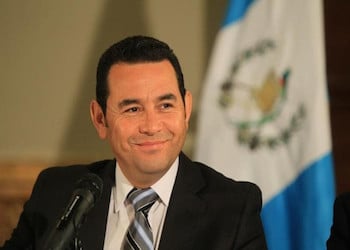Guatemala President Jimmy Morales’ reported move to try to oust the head of the country’s international anti-corruption body (CICIG) suggests that prosecutors may be uncovering damning evidence against him, including potential ties to international drug traffickers, in a situation that risks precipitating a political crisis.
Guatemalan media reported this week that President Morales may be seeking the removal of Iván Velásquez as head of the United Nations-backed International Commission against Impunity in Guatemala (Comisión Internacional contra la Impunidad en Guatemala – CICIG), amid allegations that the CICIG and Guatemala’s Attorney General’s Office (Ministerio Público – MP) have been investigating illicit finances in Morales’ 2015 presidential campaign.
The head of the Attorney General’s Office Anti-Money Laundering Unit Sara Sandoval since confirmed that they have opened an investigation into a $500,000 contribution that may have been made to the National Convergence Front (Frente de Convergencia Nacional – FCN) by alleged drug trafficker Marlon Francesco Monroy Meoño, alias “El Fantasma,” during the 2015 campaign, elPeriódico reported.
Morales was the presidential candidate and secretary general of the FCN in late 2015, following the resignation of Otto Pérez Molina. He will be meeting United Nations (UN) Secretary General Antonio Gutérres in New York on August 25. Guatemala’s Attorney General Thelma Aldana has already threatened to resign if Morales acts against Velásquez.
Monroy Meoño, a former Guatemalan military officer turned drug trafficker with alleged links to many Guatemalan elites, was arrested by Guatemalan authorities in April 2016 and subsequently extradited to the United States. At the time he was considered to be the country’s top drug boss.
SEE ALSO: Guatemala News and Profiles
Before his extradition, Monroy Meoño reportedly told elPeriódico that he had personally delivered cash to Jafeth Cabrera Cortez, the son of Guatemala’s Vice President Jafeth Cabrera, during the 2015 elections. He alleged that each drug trafficker in Guatemala had to pay a “quota” to the FCN to ensure that authorities “did not disturb them” during Morales’ administration, according to elPeriódico.
Additionally, the Attorney General’s Office Unit against Election Offenses has opened two other investigations into the FCN. The first stems from a Supreme Electoral Tribunal (TSE) complaint that the FCN failed to present a full report of contributions received in 2015, and the other is related to allegations that none of the campaign financing Morales received from overseas was reported, according to elPeriódico.
However, mixed statements are emerging regarding whether or not Morales’ New York trip is aimed at ousting CICIG head Velásquez, which could suggest the president is hesitating following the initial outcry. On August 23, Guatemala Foreign Minister Carlos Raúl Morales denied that Morales will request the removal of Velásquez as head of the CICIG, asserting that the meeting instead aims to discuss improvements to the CICIG.
InSight Crime Analysis
If the mounting rumors that Morales intends to boot out Velásquez are true, this could be the start of yet another political crisis in Guatemala’s leadership only two years after criminal allegations toppled the previous presidency.
Such a controversial decision, which some have labeled “political suicide,” could well be an indication that investigators are getting too close to comfort for Morales. Indeed, Morales’ predecessor Pérez Molina took similar action when he resisted renewing the CICIG’s mandate as the commission gradually uncovered that he was the leader of an intricate embezzlement scheme. The revelations caused him to resign, and put both him and his Vice President Roxana Baldetti behind bars.
Morales’ possible attempt to oust Velásquez also comes amid widespread international support for the CICIG and their work, and concern at his potentially destructive actions.
Several US congressmen published a statement on August 23 urging Morales to keep supporting the CICIG, adding that, “The removal of Commissioner Velásquez would force members of Congress to make tough decisions regarding the amount and nature of future foreign assistance to Guatemala.”
The US Embassy in Guatemala, the United Nations and UN Secretary General Gutérres — who will be meeting Morales — reiterated their support of the CICIG’s work, in addition to the Delegation of the European Union to Guatemala. Human Rights Watch said in a statement that removing Velásquez would be a “major blow to accountability” in Guatemala and a “blatant betrayal” of Morales’ past commitment to support the anti-corruption body.
SEE ALSO: Guatemala Elites and Organized Crime
Much is at stake if Morales goes ahead in undermining the CICIG. He could weaken US willingness to provide financial aid to the country, lose political support internationally, and stir opposition in Guatemala. This can already be seen in the strong show of disapproval by Attorney General Aldana, who has worked with the CICIG on the recent landmark anti-corruption cases.
The political turmoil unfolding could also be an “important test” for the administration of US President Donald Trump, writes Mike Allison, head of the political science department at the University of Scranton.
“When Trump was elected, there were concerns about his support for CICIG and Guatemala … given the fact that there were those on the right that were outspoken against CICIG and the Obama administration’s involvement in Guatemala,” Allison told InSight Crime.
However, Allison said that the show of support from members of US Congress and the State Department suggest that they have “no interest” in supporting Morales in his possible attempt to oust Velásquez and jeopardize the work of the CICIG. Still, even without this support, Morales could declare Velásquez a “persona non grata” in his country.

